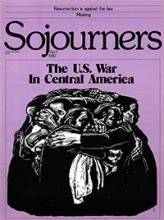The following was written by a North American church person and friend of Sojourners who was working with Salvadoran refugees in Honduras in the early 1980s. - The Editors
April 12: Entry into Jerusalem
Today I woke up between the sound of gunshots and church bells. This morning the Christian base communities gathered to begin the celebration of Holy Week: the triumphal entry of Jesus into Jerusalem. The refrain from the Misa Popular (Popular Mass) announces the hope of the people:
Lord of all the earth
Lord of all history
Who accompanies our people
Who lives in our struggles
Blessed are those who announce the gospel
The good news of liberation.
The people's reflection on the day's reading is profound: "Humbling himself, he took on the human condition, even to the point of death on a cross" (Philippians 2:8). "We too must do the same," said Maria. "We must take up the example of Jesus and follow. We've got to mix with the people."
This is the people's exegesis, a rereading of the Bible from the perspective of the poor. Here "the people" is a living reality, a drama and a passion, an incarnation of Christ. The mystique of the people is as profound as it is ordinary, drawn from everyday life.
But the Word of God has consequences. As we leave the celebration, the exits are guarded by the National Police. Four young men are detained, their arms stretched against a wall of the church. They are searched as the soldiers stand guard. Everyone leaves in haste. There is nothing we can do. As I look back, the sight of the arms stretched out against the wall leaves a vivid impression in my mind of the week's passion: the crucifixion of El Salvador.
Read the Full Article

